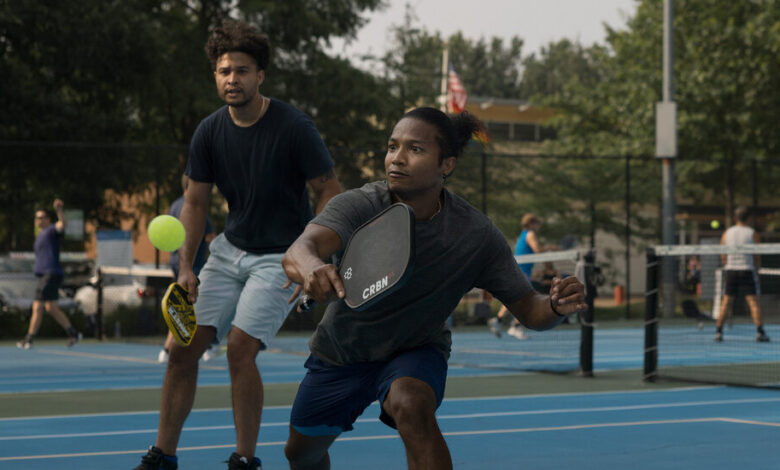The Workout All Pickleballers Should Do

For the third year in a row, pickleball has been the nation’s fastest-growing sport. Selena Gomez “dinks” on the regular, as does Jenna Bush Hager. Even Michael Phelps has traded swimming paddles for pickleball ones.
And why not? Pickleball can boost your cardiovascular health, provided you get onto the courts at least three times a week and play with enough intensity — somewhere above 75 percent of your maximum heart rate. It can also help you practice your agility and hand-eye coordination, both of which decline with age.
For all its benefits, however, pickleball does not build much muscle. And depending on how hard you play, it may not deliver the recommended dose of weekly cardiovascular exercise.
“When you look at Serena Williams and see how strong she is, it’s easy to think that’s because of tennis,” said Jasmine Marcus, a physical therapist and strength coach in Ithaca, N.Y. “But she’s strong because of the strength work she does off the courts.”
Is pickleball enough?
If you were relatively inactive before picking up the game, experts say you can make some strength and fitness gains by playing several times per week. But you will probably hit a ceiling after about eight weeks.
“Your arms and legs will get a bit stronger from playing, but you’ll quickly hit a plateau,” Dr. Marcus said. “You need to continually challenge your body with more resistance.”
The same seems to be true for cardiovascular fitness. While pickleball can initially improve it, there probably isn’t enough movement in beginner or intermediate doubles games to meet the guidelines from the Centers for Disease Control and Prevention, which recommends 150 minutes of moderate aerobic activity, or 75 minutes of vigorous activity, per week.
“The pros probably get cardiovascular endurance from playing, but I’m not sure how much overall movement I get,” said Sarah Bowen Shea, a business owner who hosts a running podcast in Portland, Ore., and plays six to eight hours of pickleball a week. “There’s a lot of starting and stopping on the court, and waiting around in between games.”
Because of this, Ms. Bowen Shea keeps running and swimming in her workout rotation, along with strength training. That’s a smart approach, said Scott Fliegelman, a top-ranked professional pickleball player in the over-50 division and the owner of Boulder Pickleball in Boulder, Colo.
“I’m a big fan of supplementary hiking for players who aren’t getting enough cardiovascular challenge on the court,” he said. “It can be a great way to build the cardiovascular base fitness needed to play for many hours without gasping for breath in between each point.”
Create a more comprehensive pickleball workout.
Rebecca Stewart, a personal trainer and coach in St. Paul, Minn., said that to find a more well-rounded level of fitness, players should supplement pickleball with strength training at least twice a week. Another option is to do some strength work on the court between games.
“You should make it your goal to progressively overload your muscles,” she said. A twice-weekly strength regimen can look similar on both days, but mix up the exercises you choose on each day in order to challenge your body.
A good routine to supplement pickleball, according to Ms. Stewart, should include the following moves, and will take you about 30 to 45 minutes to complete. You can begin with body-weight exercises, but aim to add weight as time goes on. Try for three to four sets of six to 12 repetitions. When you can repeat 10 easily, increase your weight or resistance.
Lower body work
-
Squats (whether traditional back squats or the more challenging split squats) will strengthen your legs and glutes and train your balance, which helps prevent falls on the court.
-
Lunges exercise a range of muscles and address imbalances of strength you may have in your lower body. Use front, reverse, side or curtsy lunges, or all four.
-
Dead lifts, whether Romanian or single-leg, increase your power.
Upper body work
Core work
Bonus work
If you still have time, add a few extra moves to help prevent injury.
-
Balance moves, such as single-leg marches or simply standing on one foot at a time for 30 seconds to a minute, can lower your odds of falling. When that becomes easy, try it with your eyes closed.
-
Power moves, like jump squats, dumbbell snatches, medicine-ball slams, skaters or side shuffles, will ensure you can more easily get to the ball without falling or getting hurt.
Cardiovascular training
Depending on how much pickleball you’re playing — and how intensely — you may be meeting recommendations for cardiovascular exercise. If you find that a single match wears you out, Ms. Stewart said, you need to build endurance outside of pickleball. If you can’t sprint to hit a shot, you probably need more speed.
For endurance, try 30 to 60 minutes of hiking, walking, riding a bike, running or swimming two times per week. For speed, try some kind of interval training twice a week. After a five- to 10-minute warm-up, alternate 30 second sprints with 30- to 60-second breaks, repeating four to eight times.
Pickleball intensity and duration are highly individual, so supplement based on your own level of play, how often you do it and how it leaves you feeling. But with the right training, you will feel better both on and off the court.
Amanda Loudin is a freelance writer covering health and science.
Source link



